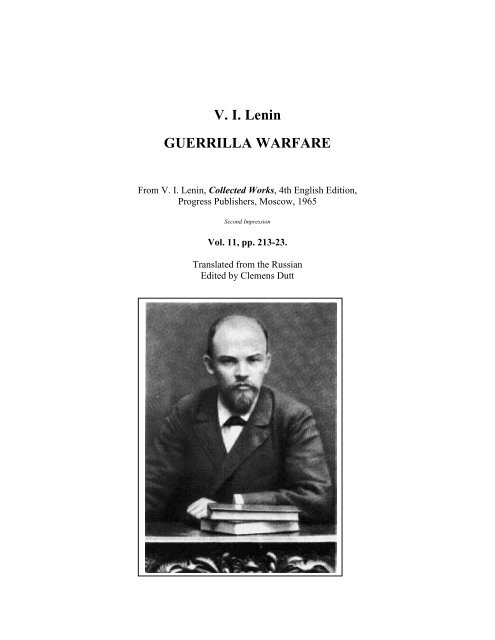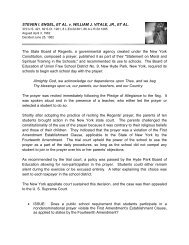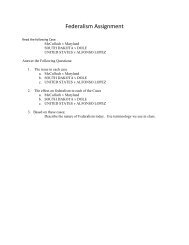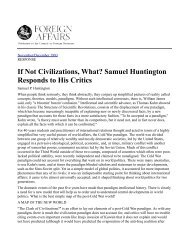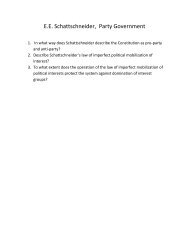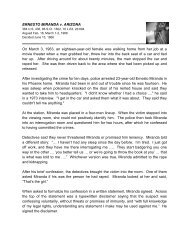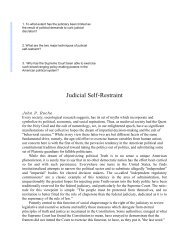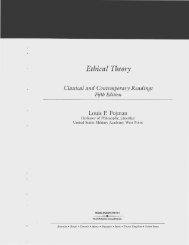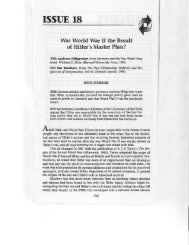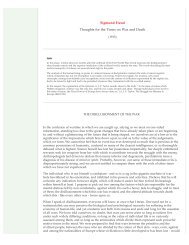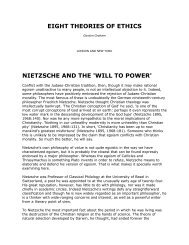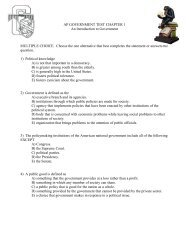V. I. Lenin GUERRILLA WARFARE - jessbcuzz
V. I. Lenin GUERRILLA WARFARE - jessbcuzz
V. I. Lenin GUERRILLA WARFARE - jessbcuzz
You also want an ePaper? Increase the reach of your titles
YUMPU automatically turns print PDFs into web optimized ePapers that Google loves.
Social-Democracy recognised street barricade fighting in the forties, rejected it fordefinite reasons at the end of the nineteenth century, and expressed complete readiness torevise the latter view and to admit the expediency of barricade fighting after theexperience of Moscow, which, in the words of K. Kautsky, initiated new tactics ofbarricade fighting.IIHaving established the general Marxist propositions, let us turn to the Russianrevolution. Let us recall the historical development of the forms of struggle it produced.First there were the economic strikes of workers (1896-1900), then the politicaldemonstrations of workers and students (1901-02), peasant revolts (1902), the beginningof mass political strikes variously combined with demonstrations (Rostov 1902, thestrikes in the summer of 1903, January 9, 1905), the all-Russian political strikeaccompanied by local cases of barricade fighting (October 1905), mass barricadefighting and armed uprising (1905, December), the peaceful parliamentary struggle(April-June 1906), partial military evolts (June 1905-July 1906) and partial peasantrevolts (autumn 1905-autumn 1906).Such is the state of affairs in the autumn of 1906 asconcerns forms of struggle in general. The “retaliatory” form of struggle adopted by theautocracy is the Black-Hundred pogrom, from Kishinev in the spring of 1903 to Sedletsin the autumn of 1906. All through this period the organization of Black-Hundredpogroms and the beating up of Jews students, revolutionaries and class-consciousworkers continued to progress and perfect itself, combining the violence of Black-Hundred troops with the violence of hired ruffians going as far as the use of artillery invillages and towns and merging with punitive expeditions, punitive trains and so forth.Such is the principal background of the picture. Against this background there standsout—unquestionably as something partial, secondary and auxiliary—the phenomenon tothe study and assessment of which the present article is devoted. What is thisphenomenon? What are its forms? What are its causes? When did it arise and how farhas it spread ? What is its significance in the general course of the revolution? What isits relation to the struggle of the working class organised and led by Social-Democracy?Suchare the questions which we must now proceed to examine after having sketched thegeneral background of the picture. The phenomenon in which we are interested is thearmed struggle. It is conducted by individuals and by small groups.Some belong toevolutionary organisations, while others (the majority in certain parts of Russia) do notbelong to any revolutionary organisation. Armed struggle pursues two different aims,which must be strictly distinguished: in the first place, this struggle aims at assassinatingindividuals, chiefs and subordinates in the army and police; in the second place, it aimsat the confiscation of monetary funds both from the government and from privatepersons. The confiscated funds go partly into the treasury of the Party, partly for thespecial purpose of arming and preparing for an uprising, and partly for the maintenanceof persons engaged in the struggle we are describing. The big expropriations (such as theCaucasian, involving over 200,000 rubles, and the Moscow, involving 875,000 rubles)went in fact first and foremost to revolutionary parties—small expropriations go mostly,and sometimes entirely, to the maintenance of the “expropriators”. This form of struggleundoubtedly became widely developed and extensive only in 1906, i.e., after theDecember uprising. The intensification of the political crisis to the point of an armedstruggle and, in particular, the intensification of poverty, hunger and unemploymentin
of the people. In such periods a Marxist is obliged to take the stand of civil war. Anymoral condemnation of civil war would be absolutely impermissible from the standpointof Marxism.In a period of civil war the ideal party of the proletariat is a fighting party.This is absolutely incontrovertible.We are quite prepared to grant that it is possible toargue and prove the inexpediency from the standpoint of civil war of particular forms ofcivil war at any particular moment. We fully admit criticism of diverse forms of civil warfrom the standpoint of military expediency and absolutely agree that in this question it isthe Social-Democratic practical workers in each particular locality who must have thefinal say. But we absolutely demand in the name of the principles of Marxism that ananalysis of the conditions of civil war should not be evaded by hackneyed and stereotypedtalk about anarchism, Blanquism and terrorism, and that senseless methods of guerrillaactivity adopted by some organisation or other of the Polish Socialist Party at somemoment or other should not be used as a bogey when discussing the question of theparticipation of the Social-Democratic Party as such in guerrilla warfare in general. Theargument that guerrilla warfare disorganises the movement must be regarded critically.Every new form of struggle, accompanied as it is by new dangers and new sacrifices,inevitably “disorganises” organisations which are unprepared for this new form ofstruggle. Our old propagandist circles were disorganised by recourse to methods ofagitation. Our committees were subsequently disorganised by recourse todemonstrations. Every military action in any war to a certain extent disorganises theranks of the fighters. But this does not mean that one must not fight. It means that onemust learn to fight. That is all. When I see Social-Democrats proudly and smuglydeclaring “we are not anarchists, thieves, robbers, we are superior to all this, we rejectguerrilla warfare”,—I ask myself: Do these people realise what they are saying? Armedclashes and conflicts between the Black-Hundred government and the population aretaking place all over the country. This is an absolutely inevitable phenomenon at thepresent stage of development of the revolution. The population is spontaneously and in anunorganised way—and for that very reason often in unfortunate and undesirable forms—reacting to this phenomenon also by armed conflicts and attacks. I can understand usrefraining from Party leadership of this spontaneous struggle in a particular place or ata particular time because of the weakness and unpreparedness of our organisation.Irealise that this question must be settled by the local practical workers, and that theremoulding of weak and unprepared organisations is no easy matter. But when I see aSocial-Democratic theoretician or publicist not displaying regret over thisunpreparedness, but rather a proud smugness and a self-exalted tendency to repeatphrases learned by rote in early youth about anarchism, Blanquism and terrorism, I amhurt by this degradation of the most revolutionary doctrine in the world. It is said thatguerrilla warfare brings the class-conscious proletarians into close association withdegraded, drunken riff-raff. That is true. But it only means that the party of theproletariat can never regard guerrilla warfare as the only, or even as the chief, methodof struggle; it means that this method must be subordinated to other methods, that it mustbe commensurate with the chief methods of warfare, and must be ennobled by theenlightening and organizing influence of socialism. And without this latter condition, all,positively all, methods of struggle in bourgeois society bring the proletariat into closeassociation with the various non-proletarian strata above and below it and, if left to thespontaneous course of events, become frayed, corrupted and prostituted. Strikes, if left to
the spontaneous course of events, become corrupted into “alliances”—agreementsbetween the workers and the masters against the consumers. Parliament becomescorrupted into a brothel, where a gang of bourgeois politicians barter wholesale andretail “national freedom”, “liberalism”, “democracy”, republicanism, anticlericalism,socialism and all other wares in demand. A newspaper becomes corrupted into a publicpimp, into a means of corrupting the masses, of pandering to the low instincts of the mob,and so on and so forth. Social-Democracyknows of no universal methods of struggle,such as would shut off the proletariat by a Chinese wall from the strata standing slightlyabove or slightly below it. At differentperiods Social-Democracy applies differentmethods, always qualifying the choice of them by strictly defined ideological andorganisational conditions.*IVThe forms of struggle in the Russian revolution are distinguished by their colossal varietycompared with the bourgeois revolutions in Europe. Kautsky partly foretold this in 1902when he said that the future revolution (with the exception perhaps of Russia, he added)might be not so much a struggle of the people against the government as a strugglebetween two sections of the people. In Russia we undoubtedly see a wider development ofthis latter struggle than in the bourgeois revolutions in the West. The enemies of ourrevolution among the people are few in number, but as the struggle grows more acutethey become more and more organized and receive the support of the reactionary strataof the bourgeoisie. It is therefore absolutely natural and inevitable that in such a period,a period of nation-wide political strikes, an uprising cannot assume the old form ofindividual acts restricted to a very short time and to a very small area. It is absolutelynatural and inevitable that the uprising should assume the higher and more complex formof a prolonged civil war embracing the whole country, i.e., an armed struggle betweentwo sections of the people. Such a war cannot be conceived otherwise than as a series ofa few big engagements at comparatively long intervals and a large number of smallencounters during these intervals. That being so—and it is undoubtedly so—the Social-Democrats must absolutely make it their duty to create organizations best adapted tolead the masses in these big engagements and, as far as possible, in these smallencounters as well. In a period when the class struggle has become accentuated to thepoint of civil war, Social-Democrats must make it their duty not only to participate butalso to play the leading role in this civil war. The Social-Democrats must train andprepare their organisations to be really able to act as a belligerent side which does notmiss a single opportunity of inflicting damage on the enemy’s forces. This is a difficult* The Bolshevik Social-Democrats are often accused of a frivolous passion for guerrilla actions. Itwould therefore not be amiss to recall that in the draft resolution on guerrilla actions (PartiiniyeIzvestia, No. 2, and <strong>Lenin</strong>’s report on the Congress), the section of the Bolsheviks who defendguerrilla actions suggested the following conditions for their recognition: “expropriations” of privateproperty were not to he permitted under any circumstances; “expropriations” of governmentproperty were not to be recommended but only allowed, provided that they were controlled by theParty and their proceeds used for the needs of an uprising. Guerrilla acts in the form of terrorismwere to be recommended against brutal government officials and active members of the BlackHundreds, but on condition that 1) the sentiments of the masses be taken into account, 2) theconditions of the working-class movement in the given locality be reckoned with, and 3) care betaken that the forces of the proletariat should not be frittered away. The practical difference betweenthis draft and the resolution which was adopted at the Unity Congress lies exclusively in the fact that“expropriations” of government property are not allowed.
task, there is no denying. It cannot be accomplished at once. Just as the whole people arebeing retrained and are learning to fight in the course of the civil war, so ourorganisations must be trained, must be reconstructed in conformity with the lessons ofexperience to be equal to this task. We have not the slightest intention of foisting onpractical workers any artificial form of struggle, or even of deciding from our armchairwhat part any particular form of guerrilla warfare should play in the general course ofthe civil war in Russia. We are far from the thought of regarding a concrete assessmentof particular guerrilla actions as indicative of a trend in Social-Democracy. But we doregard it as our duty to help as far as possible to arrive at a correct theoreticalassessment of the new forms of struggle engendered by practical life. We do regard it asour duty relentlessly to combat stereotypes and prejudices which hamper the classconsciousworkers in correctly presenting a new and difficult problem and in correctlyapproaching its solution.Proletary, No. 5 , Published according toSeptember 30, 1906 the Proletary textTHE QUESTION OF <strong>GUERRILLA</strong> <strong>WARFARE</strong>111We consider this resolution sound in principle and note its agreement with the points wedeveloped in our article “Guerrilla Warfare”. We would suggest only a few minoramendments and additions to the text of the resolution. In Point 3 of the preamble wewould say: “the revolution not being strong enough at the present time”, etc. In theresolution proper we would add repudiation of “expropriations” in agreement with thedecision of the Congress, and then a statement to the effect that guerrilla actions mustconform to the temper of the broad masses and the conditions of the working-classmovement. It is clear, however, that our Moscow comrades take this for granted.Proletary, No. 5 , Published according toSeptember 30, 1906 the Proletary text


